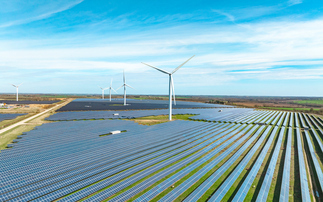Ratings agency says greater role needed for development banks in de-risking projects and mobilising private investment for meeting the SDGs
Private capital must play a far greater role in green projects throughout the developing world if governments are to deliver on the UN's Sustainable Development Goals (SDGs), S&P Global Ratings has warned.
A report by the influential credit ratings giant - titled It's Time For A Change - argues significant levels of private capital is currently available to invest in sustainable infrastructure around the world. But it warns the sustainable finance sector is being held back by investors unwillingness to embrace some of the risks associated with projects in developing economies without the promise of higher levels of returns.
The company warns this reticence can make sustainable infrastructure projects relatively costly to fund.
The UN estimates that meeting the 17 SDGs will require global investments of between $5tr to $7tr each year up to 2030.
But while private capital waiting to be deployed into infrastructure investments is at a record high, investors are less interested in projects in low income countries, which should be the key area of focus for meeting the bulk of the SDGs, the research suggests.
As much as 97 per cent of total private capital investments mobilised by multilateral lending institutions - such as the European Investment Bank (EIB) - currently occur in middle or high income countries. S&P said the failure to mobilise more investment in some of the world's poorest countries is due to fears of higher underlying investment risks in emerging markets.
At the same time, there has been a modest but continuing reduction in sovereign capital support from governments for infrastructure development projects. S&P said it therefore expected multilateral lending institutions to increasingly seek private sector financing to plug the gap.
Consequently encouraging private sector investors to engage in a wider spectrum of risks and geographies will be "critical" for meeting the SDGs, the report concludes.
It also argues a number of mechanisms exist that could help increase capital flows into emerging markets, such as credit enhancement instruments which offer a menu of risk and return options for investors. But it also warns such measures will not be sufficient on their own.
In order to increase private sector mobilisation of capital, it explains, multilateral lending institutions would likely need to support private investors through advisory services and policy reform.
It also suggests multilateral development banks will have to assume the riskiest part of investments, particularly in the early stages of projects.
"We believe that to engage the private sector on a larger scale, it's important to build a project pipeline to justify the costs of entering a new market or segment," said report author Michela Bariletti, analytical manager for infrastructure ratings at S&P. "While local investors may be in a better position to cope with country-specific risks, we understand that for international investors to ramp up their investments and make a real difference, an improvement in the investment climate in low-income emerging markets, where only three per cent of private capital is directed today, would be required."









